in用法
- 格式:docx
- 大小:27.16 KB
- 文档页数:15
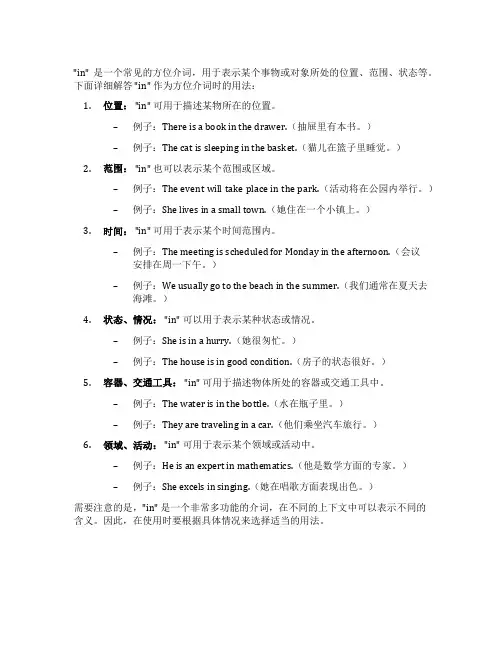
"in" 是一个常见的方位介词,用于表示某个事物或对象所处的位置、范围、状态等。
下面详细解答 "in" 作为方位介词时的用法:1.位置: "in" 可用于描述某物所在的位置。
–例子:There is a book in the drawer.(抽屉里有本书。
)–例子:The cat is sleeping in the basket.(猫儿在篮子里睡觉。
)2.范围: "in" 也可以表示某个范围或区域。
–例子:The event will take place in the park.(活动将在公园内举行。
)–例子:She lives in a small town.(她住在一个小镇上。
)3.时间: "in" 可用于表示某个时间范围内。
–例子:The meeting is scheduled for Monday in the afternoon.(会议安排在周一下午。
)–例子:We usually go to the beach in the summer.(我们通常在夏天去海滩。
)4.状态、情况: "in" 可以用于表示某种状态或情况。
–例子:She is in a hurry.(她很匆忙。
)–例子:The house is in good condition.(房子的状态很好。
)5.容器、交通工具: "in" 可用于描述物体所处的容器或交通工具中。
–例子:The water is in the bottle.(水在瓶子里。
)–例子:They are traveling in a car.(他们乘坐汽车旅行。
)6.领域、活动: "in" 可用于表示某个领域或活动中。
–例子:He is an expert in mathematics.(他是数学方面的专家。
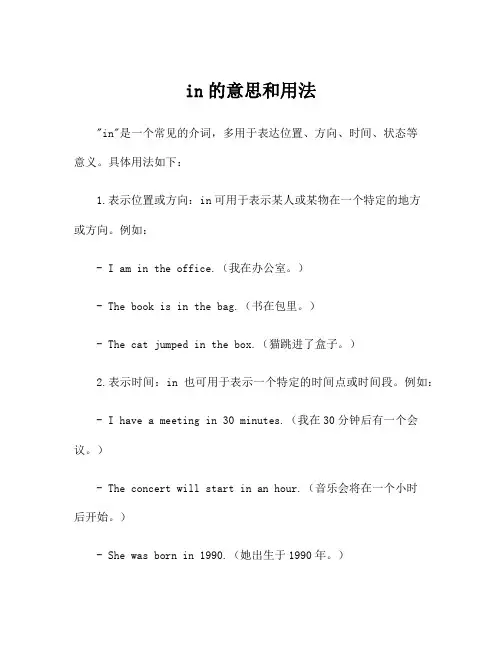
in的意思和用法"in"是一个常见的介词,多用于表达位置、方向、时间、状态等意义。
具体用法如下:1.表示位置或方向:in可用于表示某人或某物在一个特定的地方或方向。
例如:- I am in the office.(我在办公室。
)- The book is in the bag.(书在包里。
)- The cat jumped in the box.(猫跳进了盒子。
)2.表示时间:in也可用于表示一个特定的时间点或时间段。
例如:- I have a meeting in 30 minutes.(我在30分钟后有一个会议。
)- The concert will start in an hour.(音乐会将在一个小时后开始。
)- She was born in 1990.(她出生于1990年。
)3.表示状态或特定情况:in可用于表示某人或某物的状态、特定情况等。
例如:- He is in good health.(他身体状况良好。
)- The car is in excellent condition.(这辆车状态极好。
)- The company is in trouble.(公司陷入了麻烦。
)4.某些短语中的固定用法:in还在一些固定短语中使用。
例如:- in front of(在......前面)- in the middle of(在......中间)- in addition(另外)- in conclusion(总而言之)除了以上用法,"in"还有一些拓展用法,例如:-表示成员身份或归属关系:in可用于表达某人或某物是属于某个组织、团体或分组的成员。
例如:- She is in the choir.(她是合唱团的成员。
)- The document is in the file.(这个文件归档在这里。
)-表示某种情况下的特定行为或状态:in也可以用于表示进行某种特定的活动或状态。
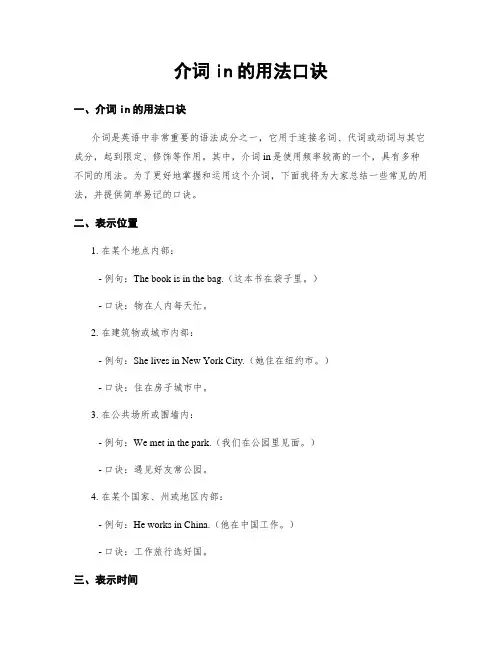
介词in的用法口诀一、介词in的用法口诀介词是英语中非常重要的语法成分之一,它用于连接名词、代词或动词与其它成分,起到限定、修饰等作用。
其中,介词in是使用频率较高的一个,具有多种不同的用法。
为了更好地掌握和运用这个介词,下面我将为大家总结一些常见的用法,并提供简单易记的口诀。
二、表示位置1. 在某个地点内部:- 例句:The book is in the bag.(这本书在袋子里。
)- 口诀:物在人内每天忙。
2. 在建筑物或城市内部:- 例句:She lives in New York City.(她住在纽约市。
)- 口诀:住在房子城市中。
3. 在公共场所或围墙内:- 例句:We met in the park.(我们在公园里见面。
)- 口诀:遇见好友常公园。
4. 在某个国家、州或地区内部:- 例句:He works in China.(他在中国工作。
)- 口诀:工作旅行选好国。
三、表示时间1. 在具体某一天或日期:- 例句:I have a meeting in June.(我在六月有一个会议。
)- 口诀:几月多添in。
2. 在某一季节或年份:- 例句:She likes to swim in summer.(她喜欢夏天游泳。
)- 口诀:四季全年夏中春。
3. 在某个具体的时间点:- 例句:The train will arrive in ten minutes.(火车将在十分钟内到达。
)- 口诀:最快十分钟到。
四、表示方式1. 在某种情况下或状态中:- 例句:He is always busy in his work.(他工作时总是很忙。
)- 口诀:工作学习用这法。
2. 根据某种计划或安排:- 例句:Let's meet at the restaurant at eight o'clock.(我们八点在餐厅见面吧。
) - 口诀:按计划进行约。
五、表示目的1. 表示进入某种状态或角色:- 例句:She dressed up as a witch in Halloween party.(她在万圣节派对上打扮成巫婆。
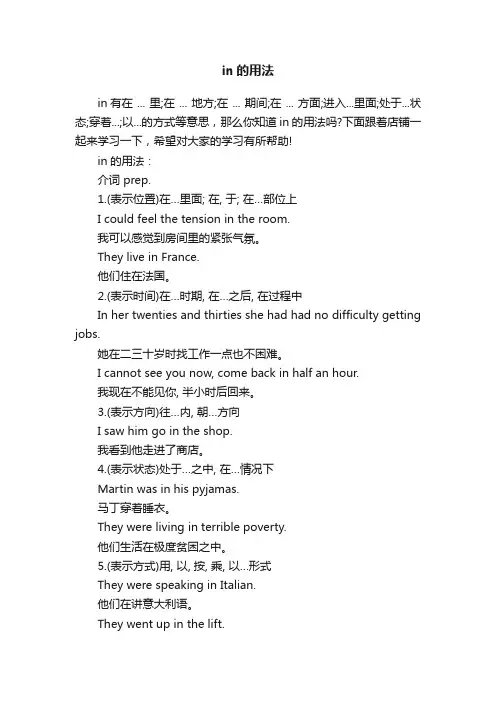
in的用法in有在 ... 里;在 ... 地方;在 ... 期间;在 ... 方面;进入...里面;处于...状态;穿着...;以...的方式等意思,那么你知道in的用法吗?下面跟着店铺一起来学习一下,希望对大家的学习有所帮助!in的用法:介词 prep.1.(表示位置)在…里面; 在, 于; 在…部位上I could feel the tension in the room.我可以感觉到房间里的紧张气氛。
They live in France.他们住在法国。
2.(表示时间)在…时期, 在…之后, 在过程中In her twenties and thirties she had had no difficulty getting jobs.她在二三十岁时找工作一点也不困难。
I cannot see you now, come back in half an hour.我现在不能见你, 半小时后回来。
3.(表示方向)往…内, 朝…方向I saw him go in the shop.我看到他走进了商店。
4.(表示状态)处于…之中, 在…情况下Martin was in his pyjamas.马丁穿着睡衣。
They were living in terrible poverty.他们生活在极度贫困之中。
5.(表示方式)用, 以, 按, 乘, 以…形式They were speaking in Italian.他们在讲意大利语。
They went up in the lift.他们乘电梯上楼了。
6.(表示原因)由于, 为了He went in fear of his life.他为自己的性命担忧, 所以走了。
7.(表示领域, 范围)在…以内It is not in my power to do that.做那事非我力所能及。
8.(表示结果)当做, 作为What did you give him in return?你给他什么作为报答呢?9.(表示目的)为了They set off in search of the lost child.他们出发去寻找走失的孩子。
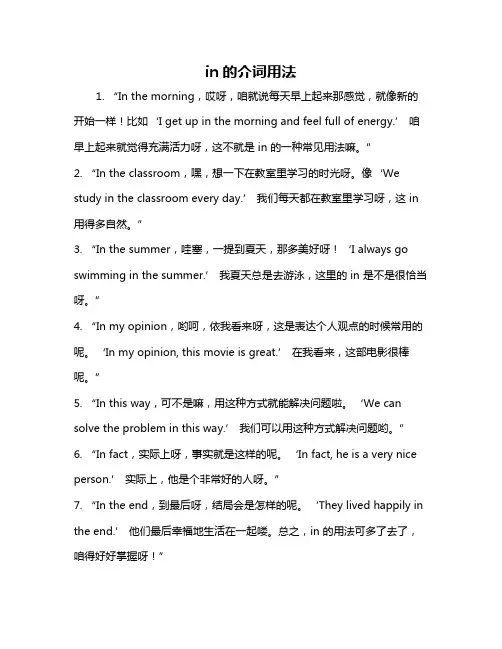
in的介词用法1. “In the morning,哎呀,咱就说每天早上起来那感觉,就像新的开始一样!比如‘I get up in the morning and feel full of energy.’ 咱早上起来就觉得充满活力呀,这不就是 in 的一种常见用法嘛。
”2. “In the classroom,嘿,想一下在教室里学习的时光呀。
像‘We study in the classroom every day.’ 我们每天都在教室里学习呀,这 in 用得多自然。
”3. “In the summer,哇塞,一提到夏天,那多美好呀!‘I always go swimming in the summer.’ 我夏天总是去游泳,这里的 in 是不是很恰当呀。
”4. “In my opinion,哟呵,依我看来呀,这是表达个人观点的时候常用的呢。
‘In my opinion, this movie is great.’ 在我看来,这部电影很棒呢。
”5. “In this way,可不是嘛,用这种方式就能解决问题啦。
‘We can solve the problem in this wa y.’ 我们可以用这种方式解决问题哟。
”6. “In fact,实际上呀,事实就是这样的呢。
‘In fact, he is a very nice person.’ 实际上,他是个非常好的人呀。
”7. “In the end,到最后呀,结局会是怎样的呢。
‘They lived happily in the end.’ 他们最后幸福地生活在一起喽。
总之,in 的用法可多了去了,咱得好好掌握呀!”。
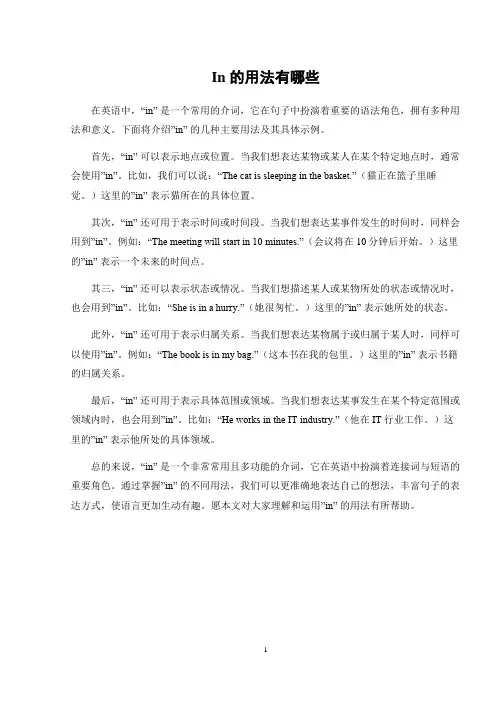
In 的用法有哪些在英语中,“in” 是一个常用的介词,它在句子中扮演着重要的语法角色,拥有多种用法和意义。
下面将介绍”in” 的几种主要用法及其具体示例。
首先,“in” 可以表示地点或位置。
当我们想表达某物或某人在某个特定地点时,通常会使用”in”。
比如,我们可以说:“The cat is sleeping in the basket.”(猫正在篮子里睡觉。
)这里的”in” 表示猫所在的具体位置。
其次,“in” 还可用于表示时间或时间段。
当我们想表达某事件发生的时间时,同样会用到”in”。
例如:“The meeting will start in 10 minutes.”(会议将在10分钟后开始。
)这里的”in” 表示一个未来的时间点。
其三,“in” 还可以表示状态或情况。
当我们想描述某人或某物所处的状态或情况时,也会用到”in”。
比如:“She is in a hurry.”(她很匆忙。
)这里的”in” 表示她所处的状态。
此外,“in” 还可用于表示归属关系。
当我们想表达某物属于或归属于某人时,同样可以使用”in”。
例如:“The book is in my bag.”(这本书在我的包里。
)这里的”in” 表示书籍的归属关系。
最后,“in” 还可用于表示具体范围或领域。
当我们想表达某事发生在某个特定范围或领域内时,也会用到”in”。
比如:“He works in the IT industry.”(他在IT行业工作。
)这里的”in” 表示他所处的具体领域。
总的来说,“in” 是一个非常常用且多功能的介词,它在英语中扮演着连接词与短语的重要角色。
通过掌握”in” 的不同用法,我们可以更准确地表达自己的想法,丰富句子的表达方式,使语言更加生动有趣。
愿本文对大家理解和运用”in” 的用法有所帮助。
1。
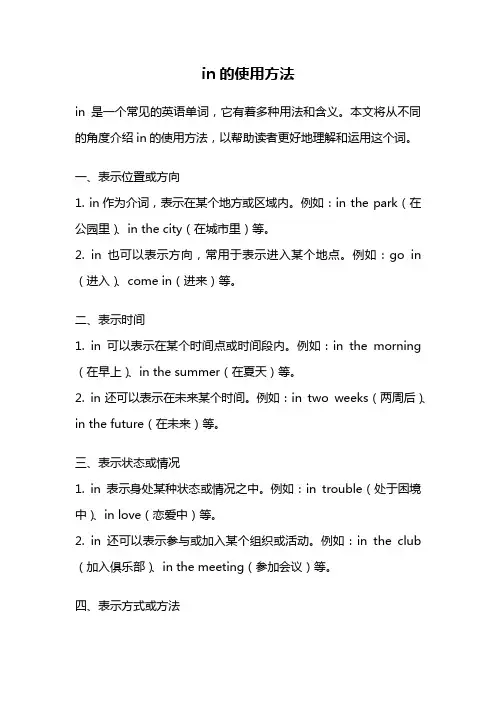
in的使用方法in是一个常见的英语单词,它有着多种用法和含义。
本文将从不同的角度介绍in的使用方法,以帮助读者更好地理解和运用这个词。
一、表示位置或方向1. in作为介词,表示在某个地方或区域内。
例如:in the park(在公园里)、in the city(在城市里)等。
2. in也可以表示方向,常用于表示进入某个地点。
例如:go in (进入)、come in(进来)等。
二、表示时间1. in可以表示在某个时间点或时间段内。
例如:in the morning (在早上)、in the summer(在夏天)等。
2. in还可以表示在未来某个时间。
例如:in two weeks(两周后)、in the future(在未来)等。
三、表示状态或情况1. in表示身处某种状态或情况之中。
例如:in trouble(处于困境中)、in love(恋爱中)等。
2. in还可以表示参与或加入某个组织或活动。
例如:in the club (加入俱乐部)、in the meeting(参加会议)等。
四、表示方式或方法1. in可表示通过某种方式或手段实现某事。
例如:in English(用英语)、in writing(以书面形式)等。
2. in还可以表示以某种方式或方法进行某种活动。
例如:in silence(默默地)、in a hurry(匆忙地)等。
五、表示所属关系1. in可表示某物或某人所属的范围或类别。
例如:in the team (在团队中)、in the family(在家庭中)等。
2. in还可以表示某物所包含的内容或成分。
例如:in the book (在书中)、in the recipe(在食谱中)等。
六、表示具体对象1. in可以表示某个具体的事物、物体或人。
例如:in the mirror (在镜子里)、in the photo(在照片中)等。
2. in还可以表示某个领域或行业。
例如:in the field of science (在科学领域)、in the fashion industry(在时尚行业)等。
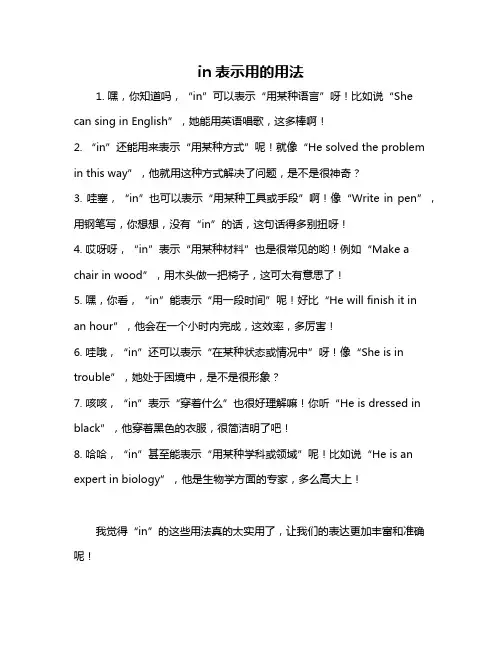
in表示用的用法
1. 嘿,你知道吗,“in”可以表示“用某种语言”呀!比如说“She can sing in English”,她能用英语唱歌,这多棒啊!
2. “in”还能用来表示“用某种方式”呢!就像“He solved the problem in this way”,他就用这种方式解决了问题,是不是很神奇?
3. 哇塞,“in”也可以表示“用某种工具或手段”啊!像“Write in pen”,用钢笔写,你想想,没有“in”的话,这句话得多别扭呀!
4. 哎呀呀,“in”表示“用某种材料”也是很常见的哟!例如“Make a chair in wood”,用木头做一把椅子,这可太有意思了!
5. 嘿,你看,“in”能表示“用一段时间”呢!好比“He will finish it in an hour”,他会在一个小时内完成,这效率,多厉害!
6. 哇哦,“in”还可以表示“在某种状态或情况中”呀!像“She is in trouble”,她处于困境中,是不是很形象?
7. 咳咳,“in”表示“穿着什么”也很好理解嘛!你听“He is dressed in
bl ack”,他穿着黑色的衣服,很简洁明了吧!
8. 哈哈,“in”甚至能表示“用某种学科或领域”呢!比如说“He is an expert in biology”,他是生物学方面的专家,多么高大上!
我觉得“in”的这些用法真的太实用了,让我们的表达更加丰富和准确呢!。
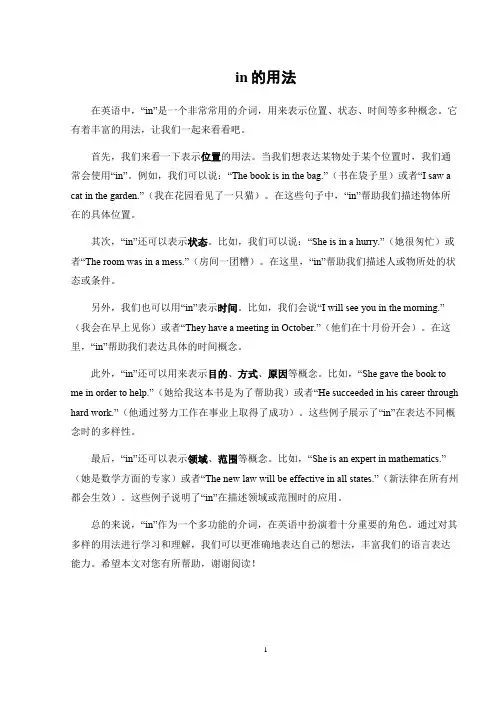
in的用法在英语中,“in”是一个非常常用的介词,用来表示位置、状态、时间等多种概念。
它有着丰富的用法,让我们一起来看看吧。
首先,我们来看一下表示位置的用法。
当我们想表达某物处于某个位置时,我们通常会使用“in”。
例如,我们可以说:“The book is in the bag.”(书在袋子里)或者“I saw a cat in the garden.”(我在花园看见了一只猫)。
在这些句子中,“in”帮助我们描述物体所在的具体位置。
其次,“in”还可以表示状态。
比如,我们可以说:“She is in a hurry.”(她很匆忙)或者“The room was in a mess.”(房间一团糟)。
在这里,“in”帮助我们描述人或物所处的状态或条件。
另外,我们也可以用“in”表示时间。
比如,我们会说“I will see you in the morning.”(我会在早上见你)或者“They have a meeting in October.”(他们在十月份开会)。
在这里,“in”帮助我们表达具体的时间概念。
此外,“in”还可以用来表示目的、方式、原因等概念。
比如,“She gave the book to me in order to help.”(她给我这本书是为了帮助我)或者“He succeeded in his career through hard work.”(他通过努力工作在事业上取得了成功)。
这些例子展示了“in”在表达不同概念时的多样性。
最后,“in”还可以表示领域、范围等概念。
比如,“She is an expert in mathematics.”(她是数学方面的专家)或者“The new law will be effective in all states.”(新法律在所有州都会生效)。
这些例子说明了“in”在描述领域或范围时的应用。
总的来说,“in”作为一个多功能的介词,在英语中扮演着十分重要的角色。

in的用法及搭配一、in的基本用法及含义在英语中,"in"是一个非常常见的介词,它有多种含义和用途。
基本上,它主要用于表示位置、时间、状态以及搭配动词时的意义转化等方面。
下面将详细介绍"in"的不同搭配和用法。
二、表示位置1. 表示在某个物体或空间的内部。
例如:- He is in the room. (他在房间里。
)- The cup is in the cabinet. (杯子在橱柜里。
)2. 表示目的地或运动方向中。
例如:- We are going for a walk in the park. (我们要去公园散步。
)- She jumped in the pool. (她跳进了泳池里。
)3. 表示某个地点范围中。
例如:- There are many restaurants in this neighborhood. (这个社区有很多餐馆。
)- I used to live in London. (我曾经住在伦敦。
)三、表示时间1. 表示将来特定的时间点或周期内。
例如:- My birthday is in November. (我的生日在11月份。
)- The conference will be held in two weeks' time. (会议将于两周后举行。
)2. 表示一段时间范围内发生的事情。
例如:- I finished reading the book in two days. (我用两天时间读完了这本书。
)3. 表示动作或状态开始的时间。
例如:- She starts work in the morning. (她早上开始工作。
)- They will arrive in an hour. (他们将在一个小时后到达。
)四、表示状态1. 表示参与某种活动或处于某种状态中。
例如:- He is in a meeting right now. (他现在正开会中。
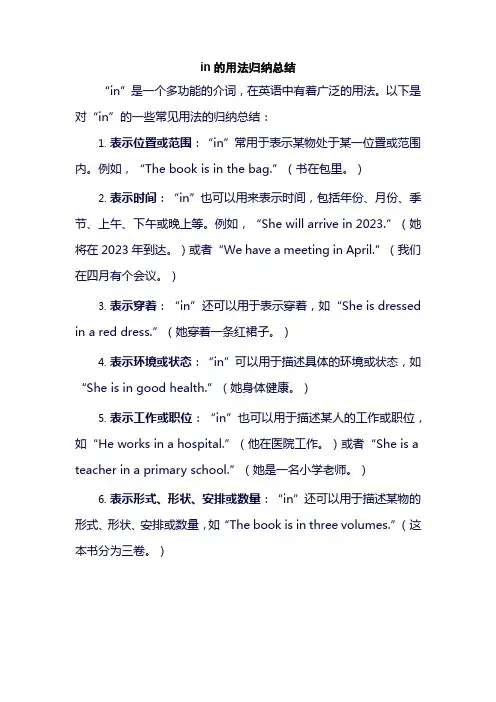
in的用法归纳总结“in”是一个多功能的介词,在英语中有着广泛的用法。
以下是对“in”的一些常见用法的归纳总结:1.表示位置或范围:“in”常用于表示某物处于某一位置或范围内。
例如,“The book is in the bag.”(书在包里。
)2.表示时间:“in”也可以用来表示时间,包括年份、月份、季节、上午、下午或晚上等。
例如,“She will arrive in 2023.”(她将在2023年到达。
)或者“We have a meeting in April.”(我们在四月有个会议。
)3.表示穿着:“in”还可以用于表示穿着,如“She is dressed in a red dress.”(她穿着一条红裙子。
)4.表示环境或状态:“in”可以用于描述具体的环境或状态,如“She is in good health.”(她身体健康。
)5.表示工作或职位:“in”也可以用于描述某人的工作或职位,如“He works in a hospital.”(他在医院工作。
)或者“She is a teacher in a primary school.”(她是一名小学老师。
)6.表示形式、形状、安排或数量:“in”还可以用于描述某物的形式、形状、安排或数量,如“The book is in three volumes.”(这本书分为三卷。
)7.表示语言或材料:“in”也可以用于表示使用的语言或材料,如“The letter is written in English.”(这封信是用英语写的。
)或者“The table is made in wood.”(这个桌子是用木头做的。
)此外,“in”还可以与其他动词搭配使用,形成固定短语,如“believe in”(信任)、“break in”(闯入)、“bring in”(引起;产生;带来)、“call in”(下令收回)、“fill in”(填充)、“get in”(收获)、“hand in”(上缴)、“involve in”(涉及)、“lie in”(在于)、“result in”(导致)、“share in”(共享)、“succeed in”(成功)、“take in”(卷起;订阅)、“turn in”(归还当局)等。
In的各种用法年、月、年月、季节、周即在“来年”,在“某月”,在“某年某月”(但在某年某月某日则用on),在四季,在第几周等都要用in。
例;in 1986 在1986年in 1927 在1927年in April 在四月in March 在三月in December 1986 1986年12月in July l983 1983年7月in spring 在春季in summer 在夏季in autumn 在秋季in winter 在冬季in the fist week of this semester 这学期的第一周in the third week 在第三周阳光、灯、影、衣、冒in,即在阳光下,在灯下,在树阴下,穿衣、着装、冒雨等都要用in。
例:Don't read in dim light. 切勿在暗淡的灯光下看书。
They are reviewing their lessons in the bright light. 他们在明亮的灯光下复习功课。
They are sitting in the shade of a tree. 他们坐在树阴下乘凉。
a prisoner in irons 带着镣铐的囚犯He went in the rain to meet me at the station. 他冒雨到车站去接我。
The poor dressed (clothed) in rags in old society. 旧社会穷人们衣衫褴褛.以及:in the bright sunlight 在明亮的阳光下a merchant in disguise 乔装的商人the woman in white (black, red, yellow) 穿着白(黑、红、黄)色衣服的妇女in uniform 穿着制服in mourning 穿着丧服in brown shoes 穿着棕色鞋in his shirt sleeves 穿着衬衫将来时态in...以后例: They will come back in 10 days. 他们将10天以后回来。
地点介词in的用法
1. 嘿,你知道吗,in 可以用来表示在一个大的地方里面呢!比如说
“In the city”,就好像我们在城市这个大大的“怀抱”里。
想想看,我们
在城市中穿梭,多有意思呀!
2. 哇塞,“in the classroom”,这就是典型的 in 的用法呀,表示在教室
里呀!这就像是我们在知识的小天地里努力探索呢!
3. 哎呀呀,“in the house”,我们在家里这个温暖的地方,难道不是用 in 来表达吗?大家在家里是不是都感觉特别安心呢?
4. 嘿,“in the park”,在公园里呀!我们在公园这个美丽的场所享受悠
闲时光,in 用得多恰当呀!
5. 你看啊,“in the country”,在乡村里呢。
乡村就像是一个宁静的港湾,我们用 in 来描述在其中,多形象啊!
6. 哈哈,“in the cinema”,在电影院里呀,我们沉浸在电影的世界里,
in 是不是很神奇呀?
7. 还有哦,“in the supermarket”,在超市里面呀。
我们在超市里挑选各种商品,in 真的太好用啦!
我觉得 in 的这些用法真的太实用啦,让我们能很准确地表达我们所处
的位置呢!。
in的用法归纳总结-----------------------------------------一、介词"in"的基本用法介词"in"是英语中使用频率非常高的一个介词,它有多种用法。
在本文中,我们将对其常见用法进行归纳总结。
1. 表示地点或位置首先,"in"可以表示地点或位置。
例如:"in the park"(在公园里)、 "in the classroom"(在教室里)等。
这里的"in"指明了物体所处的具体位置。
2. 表示时间段其次,"in"在时间表示上也经常使用。
比如:"in the morning"(在早上)、 "in July"(在七月)等。
这些短语表明了某个事件发生的时间范围。
3. 表示方式或状态此外,"in"还可表示某种方式或状态。
例如:"in a hurry"(匆忙地)、 "in good health"(身体健康)等。
这些短语描述了人或事物所处的特定状态或方式。
4. 表示成员身份另外,我们还可以利用"in"来表示成员身份。
比如:"I am in the team."(我是团队成员)。
这里,“in”表明了人或事物所属群体中的身份。
5. 表示包含关系最后,我们还可以用"in"来表示包含关系。
例如:"in this book" (在这本书中)、"in the box"(在盒子里)等。
这些短语表明了一个物体包含另一个物体的关系。
-----------------------------------------二、与“in”相关的常见短语除了上述基本用法外,有一些与“in”相关的常用短语也非常值得我们注意和学习。
介词in的用法总结你知道in的用法吗?快来一起学习吧,下面我就和大家共享,来观赏一下吧。
介词in 的用法总结1. 表示时间,表示“在……后”,留意它与after的区分:虽然两者均可与一段时间连用,表示多久之后,但in 以现在时间为起点,表示从现在起多久以后,通常用于将来时态或含有将来意味的句子;而after 则以过去或将来时间为起点,表示从那以后。
如:I’ll come back in five minutes.我5分钟后就回来。
(以现在时间为起点)He came back after five minutes.5分钟后他就回来了。
(以过去时间为起点)但是,若after后接的不是一“段”时间,而是一“点”时间,则完全可以现在时间为起点。
如:I’ll come back after five o’clock.我5点钟以后回来。
不过,在现代英语中,以上规章有时被打破。
如:I may come after a day or two.我可能过一两天会来。
Wang Bing is leaving the USA after two days.两天后王兵要离开美国。
2. 类似in three days 这样的短语,有时含义不易确定,由于它既可表示“3天内”,也可表示“3天后”,大致可以这样区分:若与连续性动词连用,则表示“3天内”,若与非连续性动词连用,则表示“3天后”。
如:He learnt English in three weeks.他在3周内学会了英语。
The train will arrive in a few minutes.火车过几分钟就到。
但语言的实际并不完全是这样,有时需视详细的上下文或语境来确定。
如:We should be able to complete the work in five days.我们应当能在5天内完成这工作。
为了明确语义,有时人们就分别用within 和after 来表示“在……内”和“在……后”:I’ll see you again within three days.3天内我再来看你。
in的用法
in的词性有介词、副词、形容词、名词,具体如下:
词性:
1.作介词时,意为“在……内;进……里;在……期间;在……以
后;穿着;在……状态中;在……方面;包含在……中;从事……;
用……语言,以……媒介;以……调;在活动过程中;在岁数;
当……时;(引出具某种品质的人的名字);占……;在……之中(用于较大和较小数字之间);以……的数量;带……颜色的;
以……方式;具有……特性;按照(表示方式)”。
2.作副词时,意为“进入;在里头;到达;当选;涨潮;在屋里;
在车站;收到;递交,送到;填写,着色;朝里,向中间;击球;
(球)落在界内;(服装等)时髦”。
3.作形容词时,意为“在里面的;时髦的;(用球)界内的”。
4.作名词时,意为“执政者;门路”。
用法:
in可以用作介词,后面可以接名词、代词或者动名词做介词宾语,
构成介词短语,在句中充当各种语法功能。
总之,“in”是一个多义词,需要根据具体的语境和含义来理解其用法和词性。
in在地点的用法在地点的用法一、介词"in"的基本含义介词"in"是英语中常见的一个介词,它有多个基本含义,其中之一就是表示"在……之内或周围"。
除此之外,它还可以表示目标、状态和方式等。
在地点方面,介词"in"用法广泛且灵活。
二、"in"表示所处的具体地点1. 表示城市或国家:我们常说"In Beijing, China."(在中国北京)"I live in New York."(我住在纽约)。
2. 表示建筑物或房间:例如"In the restaurant."(在餐厅里)"He is in his office."(他在他的办公室里)。
3. 表示限定区域:例如"In the park."(在公园里) "She is waiting for you in the lobby."(她正在大厅等你)。
三、以"in"为前缀构成的短语1. "in front of": 在......前面。
例如:"There is a car parked in front of my house."(有一辆车停在我房子前面)2. "in the middle of": 在......中央/中间。
例如:"The statue is placed in the middleof the square."(这座雕像放置于广场中央)3. "in the corner of": 在......角落里。
例如:"The cat likes to sleep in the corner of the room."(这只猫喜欢在角落里睡觉)4. "in the back of": 在......后部/背后。
<a href=>真题网提供</a><br>介词of用法归纳1: 表示剥夺,除去deprive sb. of his rightdenude sb. of his possession (hope)divest the baby of his clothesrid him of this fear rob sb. of his walletdefraud sb. of gold ringcure sb. of cancer heal sb. of cancerpurify the nation clean the jar of crustclarify the river of flowing rubbish--get rid of, rid of, dispose of2: of接直接宾语-告诉-tell sb. of sth. inform sb. of sth warn sb. of fireremind sb. of his duties acquaint sb. of sth. notify of..-其他,劝服-persuade sb. of honesty assure sb. of the best seats convince sb. of sth.-法律词汇-accuse sb. of burglary ; convict sb. of murder; suspect sb. of a theft-reassure his wife of his safe arrival3: of接间接宾语request sth. of sb. expect sth. of sb. require sth. of sb.ask a question of sb. be fearful of mistakes be jealous of wealthy persons be reminiscent of his past be patient ofthe enormous noise be guilty of robbery be innocent of robbery4: of表示人物的特性,籍贯,特性或出生等He is of Irish descend (ascent)People of obscure origin (humble /noble)Man of keen perception a man of moral integrity5: 固定词组-say of, tale of, hear of, think of, learn of, savor of The room smells of stale cabbage.-brag of his achievements. Boast of his childrenbeware of pickpockets approve of the programdoubt of success complain of poor management-be sure of be suspicious of be aware ofbe confident of be proud of be ashamed ofbe afraid of be capable of be lack ofbe critical of be shortly of be conscious ofbe ignorant of be wary of be cautious ogbe appreciative of your advice-regardless of , irrespective of ,不管….无视in favor ofdecide on three most popular leisureactivities irrespective of age<a href=>真题网提供</a><br><a href=>真题网提供</a><br>介词用法口诀早、午、晚要用in,at黎明、午夜、点与分。
年、月、年月、季节、周,阳光、灯、影、衣、冒in。
将来时态in...以后,小处at大处in。
有形with无形by,语言、单位、材料in。
特征、方面与方式,心情成语惯用in。
介词at和to表方向,攻击、位置、恶、善分。
日子、日期、年月日,星期加上早、午、晚,收音、农场、值日on,关于、基础、靠、著论。
着、罢、出售、偷、公、假,故意、支付、相反,准。
特定时日和"一……就",on后常接动名词。
年、月、日加早、午、晚,of之前on代in。
步行、驴、马、玩笑on,cab,carriage则用in。
at山脚、门口、在当前,速、温、日落、价、核心。
工具、和、同随with,具有、独立、就、原因。
就……来说宾译主,对、有、方状、表细分。
海、陆、空、车、偶、被by,单数、人类know to man。
this、that、tomorrow,yesterday,next、last、one。
接年、月、季、星期、周,介词省略已习惯。
over、under正上下,above、below则不然,若与数量词连用,混合使用亦无关。
'beyond超出、无、不能,against靠着,对与反。
besides,except分内外,among之内along沿。
同类比较except,加for异类记心间。
原状because of,、 owing to、 due to表语形容词under后接修、建中,of、from物、化分。
before、after表一点, ago、later表一段。
before能接完成时,ago过去极有限。
since以来during间,since时态多变换。
与之相比beside,除了last but one。
复不定for、找、价、原,对、给、段、去、为、作、赞。
快到、对、向towards,工、学、军、城、北、上、南。
but for否定用虚拟,复合介词待后言。
ing型由于鉴,除了除外与包合。
之后、关于、在......方面,有关介词须记全。
in内to外表位置,山、水、国界to在前。
如大体掌握如上介调用法口诀,就不易出错。
当然,至于介词的详尽用法,同形词又是连词及副词等内容此章不讲。
下面对该口诀分别举例帮助你理解消化。
早、午、晚要用in例:in the morning 在早上in the afternoon 在下午in the evening 在晚上in the day 在白天at黎明、午、夜、点与分例: at dawn, at daybreak 在黎明时候at noon 在中午at night 在夜间at midnight 在午夜以上短语都不用冠词at six o'clock 在6点钟at 7:30 (seven thirty) 在7点半at half past eleven 在11点半at nine fifteen 在9点15分at ten thirty a.m. 在上午10点30分也可以写成seven to five 5点差7分(半小时以上)five minutes after two 2点过5分at a quarter to two 1点45分at the weekend 在周末年、月、年月、季节、周即在"来年",在"某月",在"某年某月" (但在某年某月某日则用on),在四季,在第几周等都要用in。
例;in 1986 在1986年in 1927 在1927年in April 在四月in March 在三月in December 1986 1986年12月in July l983 1983年7月in spring 在春季 in summer 在夏季in autumn 在秋季 in winter 在冬季in the fist week of this semester 这学期的第一周in the third week 在第三周阳光、灯、影、衣、冒 in,即在阳光下,在灯下,在树阴下,穿衣、着装、冒雨等都要用in。
例:Don't read in dim light. 切勿在暗淡的灯光下看书。
They are reviewing their lessons in the bright light. 他们在明亮的灯光下复习功课。
They are sitting in the shade of a tree. 他们坐在树阴下乘凉。
a prisoner in irons 带着镣铐的囚犯He went in the rain to meet me at the station. 他冒雨到车站去接我。
The poor dressed (clothed) in rags in old society. 旧社会穷人们衣衫褴褛.以及:in the bright sunlight 在明亮的阳光下a merchant in disguise 乔装的商人the woman in white (black, red, yellow) 穿着白(黑、红、黄)色衣服的妇女in uniform 穿着制服in mourning 穿着丧服in brown shoes 穿着棕色鞋in his shirt sleeves 穿着衬衫将来时态in...以后例: They will come back in 10 days. 他们将10天以后回来。
I'll come round in a day or two. 我一两天就回来。
We'll be back in no time. 我们一会儿就回来。
Come and see me in two days' time. 两天后来看我。
(从现在开始)after... (从过去开始)小处at大处in例:Li and I arrived at Heishan county safe and sound, all is well. Don't worry. 李和我平安地到达黑山县,一切很好,勿念。
I live in a great city (big city), my sister lives at a small town while my parents live at a village. 我住在大城市,我姐姐住在一个小城镇,而我的父母则住在农村。
I'm in Liaoning, at Anshan. 我住在辽宁省鞍山市."介词at、to表方向,攻击、位置、善、恶、分"。